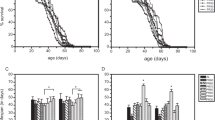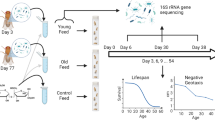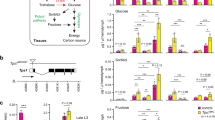Abstract
Dietary restriction extends the lifespan of numerous, evolutionarily diverse species1. In D. melanogaster, a prominent model for research on the interaction between nutrition and longevity, dietary restriction is typically based on medium dilution, with possible compensatory ingestion commonly being neglected. Possible problems with this approach are revealed by using a method for direct monitoring of D. melanogaster feeding behavior. This demonstrates that dietary restriction elicits robust compensatory changes in food consumption. As a result, the effect of medium dilution is overestimated and, in certain cases, even fully compensated for. Our results strongly indicate that feeding behavior and nutritional composition act concertedly to determine fly lifespan. Feeding behavior thus emerges as a central element in D. melanogaster aging.
This is a preview of subscription content, access via your institution
Access options
Subscribe to this journal
Receive 12 print issues and online access
$259.00 per year
only $21.58 per issue
Buy this article
- Purchase on Springer Link
- Instant access to full article PDF
Prices may be subject to local taxes which are calculated during checkout


Similar content being viewed by others
References
Guarente, L. & Kenyon, C. Genetic pathways that regulate ageing in model organisms. Nature 408, 255–262 (2000).
Guarente, L. & Picard, F. Calorie restriction—the SIR2 connection. Cell 120, 473–482 (2005).
Lane, M.A., Mattison, J., Ingram, D.K. & Roth, G.S. Caloric restriction and aging in primates: Relevance to humans and possible CR mimetics. Microsc. Res. Tech. 59, 335–338 (2002).
Roth, G.S., Ingram, D.K. & Lane, M.A. Caloric restriction in primates and relevance to humans. Ann. NY Acad. Sci. 928, 305–315 (2001).
Weindruch, R. & Walford, R.L. The Retardation of Aging and Disease by Dietary Restriction (C.C. Thomas, Springfield, Illinois, 1988).
Longo, V.D. & Finch, C.E. Evolutionary medicine: from dwarf model systems to healthy centenarians? Science 299, 1342–1346 (2003).
Walford, R.L., Harris, S.B. & Gunion, M.W. The calorically restricted low-fat nutrient-dense diet in Biosphere 2 significantly lowers blood glucose, total leukocyte count, cholesterol, and blood pressure in humans. Proc. Natl. Acad. Sci. USA 89, 11533−11537 (1992).
Walford, R.L., Mock, D., Verdery, R. & MacCallum, T. Calorie restriction in Biosphere 2: alterations in physiologic, hematologic, hormonal, and biochemical parameters in humans restricted for a 2-year period. J. Gerontol. A Biol. Sci. Med. Sci. 57, B211–B224 (2002).
Heilbronn, L.K. & Ravussin, E. Calorie restriction and aging: review of the literature and implications for studies in humans. Am. J. Clin. Nutr. 78, 361–369 (2003).
Klass, M.R. A method for the isolation of longevity mutants in the nematode Caenorhabditis elegans and initial results. Mech. Ageing Dev. 22, 279–286 (1983).
Apfeld, J. & Kenyon, C. Regulation of lifespan by sensory perception in Caenorhabditis elegans. Nature 402, 804–809 (1999).
Lakowski, B. & Hekimi, S. The genetics of caloric restriction in Caenorhabditis elegans. Proc. Natl. Acad. Sci. USA 95, 13091–13096 (1998).
Chapman, T. & Partridge, L. Female fitness in Drosophila melanogaster: an interaction between the effect of nutrition and of encounter rate with males. Proc. R. Soc. Lond. B 22, 755–759 (1996).
Rogina, B., Helfand, S.L. & Frankel, S. Longevity regulation by Drosophila Rpd3 deacetylase and caloric restriction. Science 298, 1745 (2002).
Gelperin, A. & Dethier, V.G. Long-term regulation of sugar intake by blowfly. Physiol. Zool. 40, 218 (1967).
Simpson, S.J. et al. The patterning of compensatory sugar feeding in the Australian sheep blowfly. Physiol. Ent. 14, 91–105 (1989).
Edgecomb, R.S., Harth, C.E. & Schneiderman, A.M. Regulation of feeding behavior in adult Drosophila melanogaster varies with feeding regime and nutritional state. J. Exp. Biol. 197, 215–235 (1994).
Thompson, E.D., Reeder, B.A. & Bruce, R.D. Characterization of a method for quantitating food consumption for mutation assays in Drosophila. Environ. Mol. Mutagen. 18, 14–21 (1991).
Driver, C.J., Wallis, R., Cosopodiotis, G. & Ettershank, G. Is a fat metabolite the major diet dependent accelerator of aging? Exp. Gerontol. 21, 497–507 (1986).
Mair, W., Piper, M.D. & Partridge, L. Calories do not explain extension of life span by dietary restriction in Drosophila. PLoS Biol. 3, e223 (2005).
Acknowledgements
Supported by a Lawrence L. and Audrey W. Ferguson Fellowship from the Caltech Division of Biology to G.B.C., a grant from the American Federation for Aging Research and a postdoctoral fellowship from the John Douglas French Foundation for Alzheimer's Research to P.K., and grants to S.B. from the US National Institutes of Health (AG16630, AG24366 and DK070154), the National Science Foundation (MCB-0418479) and the Ellison foundation.
Author information
Authors and Affiliations
Ethics declarations
Competing interests
The authors declare no competing financial interests.
Supplementary information
Rights and permissions
About this article
Cite this article
Carvalho, G., Kapahi, P. & Benzer, S. Compensatory ingestion upon dietary restriction in Drosophila melanogaster. Nat Methods 2, 813–815 (2005). https://doi.org/10.1038/nmeth798
Published:
Issue Date:
DOI: https://doi.org/10.1038/nmeth798
This article is cited by
-
Expansion and application of dye tracers for measuring solid food intake and food preference in Drosophila
Scientific Reports (2021)
-
Nutrigenomics as a tool to study the impact of diet on aging and age-related diseases: the Drosophila approach
Genes & Nutrition (2019)
-
An overview of two decades of diet restriction studies using Drosophila
Biogerontology (2019)
-
Measurement of solid food intake in Drosophila via consumption-excretion of a dye tracer
Scientific Reports (2018)
-
A quantitative feeding assay in adult Drosophila reveals rapid modulation of food ingestion by its nutritional value
Molecular Brain (2015)



